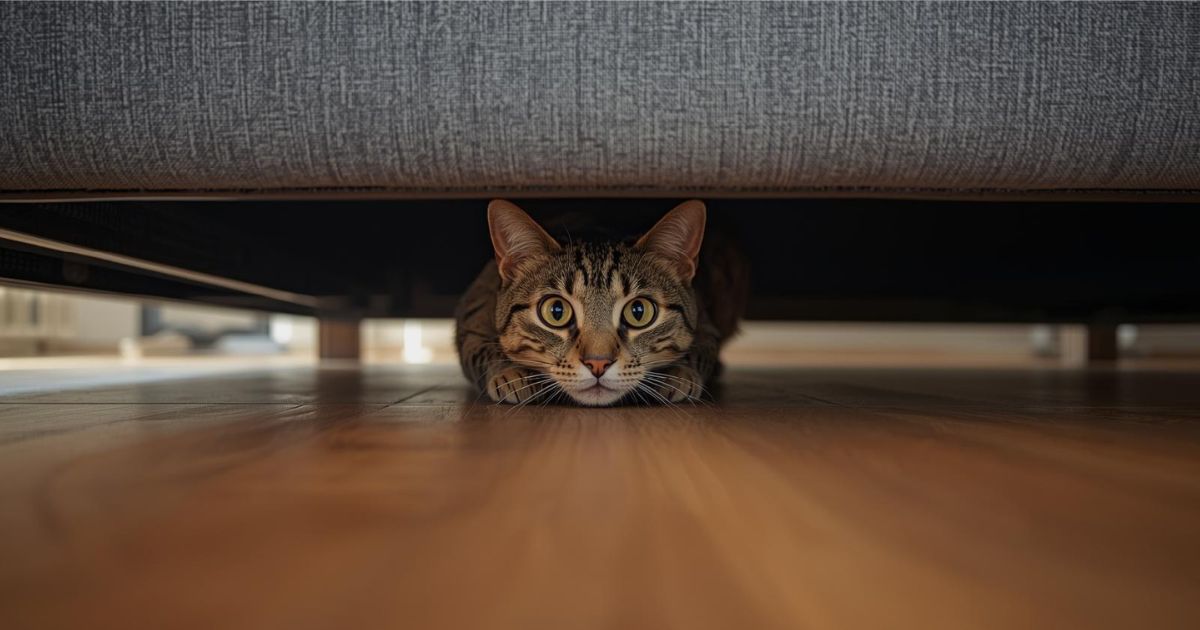Cat Hiding Behavior: When to Worry & When It's Normal
Heads up: This post contains affiliate links. If you buy something through them, I earn a small commission at no extra cost to you. It keeps the lights on and the kibble bowl full. Read the full boring legal stuff here.

Quick Answer: Cats hide because they're wired to seek safe spaces as both predators and prey. A few hours of hiding is normal. Over 24 hours, especially with no eating, drinking, or litter box use, signals potential illness or severe stress requiring a vet visit. Most hiding is behavioral (stress, new environments, overstimulation), but sudden changes in hiding patterns can indicate pain, UTIs, dental issues, or other medical problems.
Cats are mysterious little ninjas.
One moment they're demanding attention like furry royalty, and the next, they've vanished into the void, a.k.a. that weird corner under the bed you haven't vacuumed since 2015.
If you've owned a cat for more than five minutes, you've seen it: the sudden, unexplainable hiding.
And you've probably asked yourself: "Is my cat just being dramatic... or is something actually wrong?"
Let's break it down, what's normal, what's not, and when your cat's hide-and-seek habit deserves more than an eye-roll.
Why Cats Hide (Because They're Cats)
Hiding is as natural to cats as glaring at you while knocking over your coffee.
It's not always a red flag, in fact, it's one of their main coping strategies.
Here's what's probably happening when your cat suddenly disappears:
They're Just Doing Cat Stuff
Cats are both predator and prey in the wild, which means they're wired to find cozy, safe hideouts.
VCA Animal Hospitals points out that hiding provides comfort and a sense of control over their environment.
Translation: your cat hides because it feels good.
It's their version of noise-canceling headphones and a "Do Not Disturb" sign.
Are you dreaming of becoming a Cat Whisperer ? Then check out our Cat Body Language Complete Guide
They're Stressed (And You're Probably Why)
Moving? New roommate? Switched from tuna to "ocean whitefish" flavored kibble?
That last one is basically betrayal in a bag, by the way.
Stress is one of the biggest reasons cats go MIA. The ASPCA says even minor household changes can trigger hiding, aggression, or appetite changes.
Your cat isn't "just sensitive", they're trying to survive your life choices.
They're Sick or Hurting
Here's where it gets serious.
When cats don't feel well, their instinct is to hide, a leftover survival behavior from their wild ancestors who knew looking weak meant becoming lunch.
So if your normally social cat suddenly ghosts you for more than a day, something could be off.
PetMD notes that sudden or prolonged hiding can signal medical issues like:
- Urinary tract infections (painful as hell)
- Dental pain (imagine a constant toothache you can't explain)
- Digestive problems (nausea, constipation, blockages)
- Arthritis (moving hurts, so why move?)
- Injuries or infections you can't see
Sometimes your cat's secret bunker isn't just for peace and quiet, it's a pain management strategy.
How Long Is "Too Long" to Hide?
Let's set expectations. Cats don't follow your schedule.
That said, here's a rough guideline:
| Hiding Duration | What It Probably Means | What You Should Do |
|---|---|---|
| A few hours | Totally normal, chill out | Leave them alone. They'll reappear when ready to judge you again. |
| 12-24 hours | Possibly stress or overstimulation | Make sure they're eating, drinking, and using the litter box. |
| Over 24 hours | Red flag territory | Schedule a vet visit, especially with no eating, weird posture, or lethargy. |
| Several days | Emergency situation | Your cat's not "just shy." Something's wrong. Call the vet. |
If your cat's in a new environment (like after moving), hiding for a few days is common.
But if you've lived in the same house for years and suddenly can't find them, start worrying.
"But My Cat Always Hides, That's Just Her Personality"
Fair point. Some cats are introverts with fur.
If your cat has always been the quiet, behind-the-couch type, that's probably just who they are.
The trick is to notice changes in behavior. For example:
- Your cat usually hides but now won't come out even for food or toys
- They've picked a new, inaccessible spot (like behind the washer)
- They're hissing, trembling, or avoiding touch when they normally don't
That's your sign something's off.
Cats are creatures of habit, and breaking those habits is basically their way of raising a furry little red flag.
The Worry Scale of Cat Hiding
Let's get visual for a second.
Here's your Hiding Behavior Worry Scale™, ranked from "Don't Panic" to "Call the Vet Right Now."
| Level | Behavior | What It Means | Action |
|---|---|---|---|
| 1 | Napping under the bed | Normal, classic cat move | Respect the nap |
| 2 | Avoiding visitors | Shy or cautious | No big deal |
| 3 | Hiding for hours after loud noise | Startled | Give space |
| 4 | Not eating or drinking | Stress or illness | Monitor closely |
| 5 | Hiding + no litter box use | Pain, blockage, or fear | Vet time |
| 6 | Disappears for >24 hours indoors | Something's wrong | Immediate vet visit |
If your cat's in the 4-6 range, that's not a "wait and see" situation.
Call your vet.
What to Do When Your Cat Goes Full Hermit Mode
You can't exactly negotiate with a cat, but you can make them feel safer.
Here's how to coax your furry introvert back into the land of the living:
Create Safe Zones They'll Actually Use
Set up cozy hiding spots that aren't too hidden, like a covered bed, a box with a blanket, or a space behind furniture where you can still see them.
This way, your cat feels secure without turning into a ghost.
Use Calming Aids (The Legal Kind)
Pheromone diffusers like Feliway can help reduce stress levels.
They mimic the calming scents cats naturally produce, which basically tells your cat, "Hey, relax, no one's coming for your territory."
You can also try calming treats or sprays, but don't overdo it.
You're trying to comfort them, not sedate them.
Stick to a Routine (Cats Are Control Freaks)
Cats are little control freaks. Any disruption to their schedule, feeding, playtime, or litter box cleaning, can send them into hiding.
Keep things predictable. Same time, same place, same food.
If you want to switch brands, do it gradually.
Or be prepared to find your cat living behind the couch for a week out of protest.
Play Therapist (Literally)
Engage them gently with interactive toys like Da Bird or laser pointers to rebuild trust and curiosity.
Don't force interaction. Cats like to believe they're in charge.
Let them "discover" that they actually want to come out and play.
Rule Out Medical Issues
If hiding becomes chronic, especially alongside weight loss, vomiting, or not eating, don't assume it's just anxiety.
Your vet can rule out medical problems like hyperthyroidism, dental pain, or kidney disease.
Remember: "They're just moody" is not a medical diagnosis.
Why Some Cats Hide More Than Others
Like people, cats come with personalities—and trauma.
Rescue cats, for example, might have a history that makes them more fearful.
Loud households or constant changes in routine can also make hiding more frequent.
Interestingly, research from PLOS One found that cats who have hiding spaces available show lower stress hormone levels.
Translation: giving your cat a place to hide can actually make them less likely to be chronically anxious.
So don't take away their safe space. Just make sure it's a healthy one.
The Don'ts (Unless You Enjoy Getting Scratched)
Let's be clear about what not to do when your cat's in hiding:
- Don't pull them out by force. (They will remember. Forever.)
- Don't chase them around with toys like a toddler on sugar.
- Don't yell or clap to "scare them out." You'll just teach them to hide longer.
- Don't assume they're being dramatic. (Even if they are, pain still trumps sass.)
Patience and calmness always win.
Your cat doesn't respond to pressure—they respond to safety.
When to Actually Worry (The Big List)
If your cat is hiding and any of these things also happen, call the vet:
- No eating or drinking for over 24 hours
- No litter box use for 24 hours
- Excessive vocalizing or crying when touched
- Panting or breathing weirdly
- Trembling or staying hunched up
- Discharge from eyes, nose, or mouth
- Any signs of injury, bleeding, or limping
Cats are masters of disguise, and not in a cute Halloween costume way.
They hide pain really well. By the time they act sick, it's often serious.
Better to be the "over-reactive" pet parent than the one saying, "I thought she was just tired."
Helping a Cat Adjust After Big Changes
Big life changes freak cats out more than your phone's new iOS update.
Here's how to ease them through:
- Moving homes? Keep them in one quiet room with familiar smells (blankets, toys) for a few days.
- New baby or pet? Introduce slowly. Cats need time to figure out what this new loud creature is doing in their house.
- Renovations or new furniture? Gradually reintroduce them to the space instead of letting them walk into chaos.
Basically: Don't throw your cat into a new world overnight and expect them to vibe.
They're not adaptable golden retrievers.
Final Reality Check
Hiding is a normal part of cat behavior, a built-in coping tool.
But if it becomes obsessive, lasts longer than a day, or pairs with other weird symptoms, that's when to trade your Google search for an actual vet visit.
Most of the time, though, your cat's just taking a mental health day.
Let them. They've been putting up with you all week.
🐾 Frequently Asked Questions
Q Is it normal for cats to hide all day?
Depends on the cat. Some cats are natural introverts who prefer quiet spaces, that's their personality. But if your normally social cat suddenly starts hiding all day, especially for more than 24 hours, that's not normal. It could be stress, illness, or pain. Check if they're eating, drinking, and using the litter box. If any of those stop, it's vet time. "They're just shy" doesn't cut it when they're refusing food.
Q How do I know if my cat is hiding because of stress or illness?
Watch for other symptoms. Stress hiding usually comes with identifiable triggers (moving, new pet, loud noises) and your cat will still eat, drink, and use the litter box eventually. Illness hiding comes with red flags: not eating for 24+ hours, no litter box use, weird vocalizing, trembling, or hunched posture. If you can't identify an obvious stressor and the hiding persists, assume medical until your vet says otherwise.
Q Should I force my cat out of hiding?
Hell no. Forcing a scared or sick cat out of hiding destroys trust and can make them hide longer or more intensely. It also risks getting you scratched or bitten. Instead, make their hiding spot accessible so you can monitor them, provide food/water nearby, and let them come out on their own terms. If they won't come out for over 24 hours and aren't eating, you need a vet visit, don't play the waiting game.
Q My cat hides whenever we have visitors. Is this a problem?
Not really. Lots of cats are antisocial and hate strangers in their territory. If your cat consistently hides during visits but comes out fine once guests leave, that's just their personality. It becomes a problem if they start hiding from YOU, stop eating, or won't come out even after guests leave. You can help shy cats by providing safe elevated spaces and not forcing interactions with visitors who "just want to pet the kitty."
Q Can I train my cat to stop hiding?
You can't train a cat to stop their natural instinct to seek safe spaces, and honestly, you shouldn't. Hiding is how cats self-regulate stress. What you CAN do is provide appropriate hiding spots (cat caves, covered beds) so they feel secure without disappearing into inaccessible areas. You can also reduce triggers that cause excessive hiding, keep routines consistent, use calming pheromones, and make sure they have plenty of enrichment. But trying to eliminate hiding entirely just creates a more anxious cat.








💬 Comments (0)
No comments yet. Be the first to share your thoughts! 👇
✍️ Leave a Reply